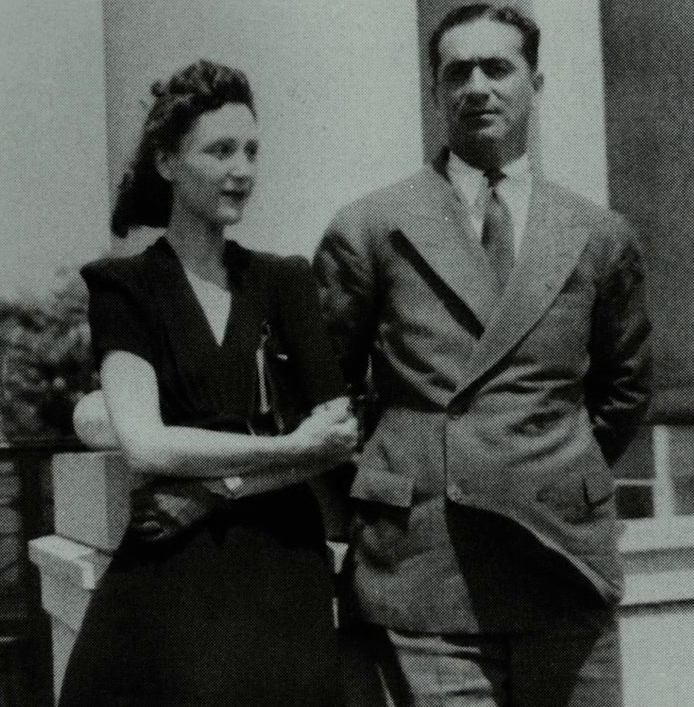In Ben Lewin’s biographical war film ‘The Catcher Was a Spy,’ Moe Berg is in a relationship with Estella Huni while he joins the Office of Strategic Services to serve his country. When he gets assigned to kill Werner Heisenberg and Germany’s supposed plans to make an atomic bomb, Moe gets forced to bid adieu to Estella. Even though they manage to remain in touch after the former baseball catcher departs from the United States, they don’t get together. In reality, as the film depicts, Moe and Estella’s relationship ended during the war. Therefore, he couldn’t marry her. Estella continued to live mysteriously after their separation, just like her former partner!
Who Was Estella Huni?
Estella Huni was born to musicians. Her father owned the New Haven School of Music and was an opera baritone and her mother was a violinist. As she grew up, she became a pianist as well. After attending Matthay School of Pianoforte in London, England, Estella returned to New York in 1934. By then her parents had died and she had sold the music school. Estella and Moe got closer during their stay in New York. “They were two vivacious, intelligent people, absorbed in the world around them, and they had a lot of fun together. Berg loved to be out on the town in New York, and so did Estella,” Nicholas Dawidoff wrote about them in ‘The Catcher Was a Spy: The Mysterious Life of Moe Berg.’

Moe’s brother Sam described Estelle as “the most beautiful and cultivated and intelligent girl I have ever known.” The couple used to live together in New York but Moe didn’t introduce his partner to many of his acquaintances during the stay. In 1944, Moe had to leave Estella as an OSS officer joining World War II. The separation at first was bearable. “There is absolutely no need for you to worry or be concerned about me,” she wrote him once, according to Dawidoff’s book. However, Moe eventually stopped contacting Estella. “His [Moe’s] communications soon grew sparse, and her resolve wavered. […] Berg used the distance to create distance. Many couples survived the war, but Moe Berg and Estella Huni did not,” the book further reads.
What Happened to Estella Huni?
When Estella got convinced that she shouldn’t wait for Moe anymore, she married a naval officer named Charles Reginald Kahn in 1945 in New York. “Years later, she [Estella] said she was relieved, that Berg had been a physical addiction and ultimately would have been impossible to live with,” Dawidoff wrote in his book. After the wedding, Estella and Kahn settled in New Jersey. Once the war was over, Berg reached out to his former lover and her current husband. “Aside from one brief, awkward afternoon when Berg called on Estella and her husband, it can’t be said whether Estella ever saw Berg again or even how much she thought about him,” reads ‘The Catcher Was a Spy.’

Estella didn’t discuss her relationship with Moe with her children. “She [Estella] never spoke about him [Moe], even to her children, who describe their mother as an extremely secretive woman who was a mystery to them. ‘In many ways,’ says Christine Curtis, Estella’s daughter, ‘my mother was as elusive as Mr. Berg,’” Dawidoff added. According to his biographer, Moe didn’t accept Estella’s marriage well. “She had brought him companionship, intimacy, and diversions, both social and intellectual. But she was now married, which inconvenienced Berg more than it buffeted him,” the author wrote about Moe’s life after World War II.
After separating from Estella, Moe didn’t have a long-lasting relationship. He died in 1972, never having married. “Save his romance with Estella Huni, Berg’s known relationships with women were superficial and confused. He had sex, but only with Estella did it deepen into lasting affection, and then he let her go too,” his biography further reads. In 1992, around twenty years after Moe’s death, Estella passed away in Florida. The cause of her death has not been revealed by her family. She was around eighty-one years old at the time of her demise.
Dawidoff garnered the majority of information concerning Estella from her son Paul Kahn, who shared her papers with the author. He also spoke to her daughter Christine Curtis by phone to learn more about her.
Read More: The Catcher Was a Spy Ending: Why Didn’t Moe Berg Kill Werner Heisenberg, Explained


You must be logged in to post a comment.